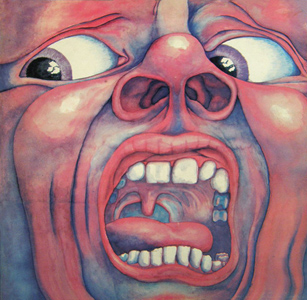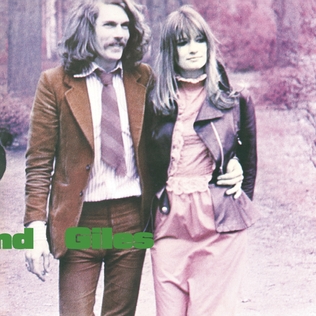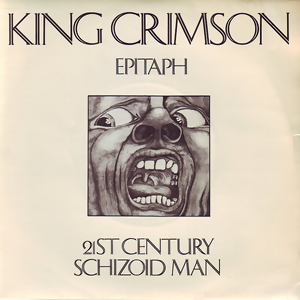
King Crimson were an English progressive rock band formed in 1968 in London. The band drew inspiration from a wide variety of music, incorporating elements of classical, jazz, folk, heavy metal, gamelan, blues, industrial, electronic, experimental music and new wave. They exerted a strong influence on the early 1970s progressive rock movement, including on contemporaries such as Yes and Genesis, and continue to inspire subsequent generations of artists across multiple genres. The band earned a large cult following.

Robert Fripp is an English musician, songwriter, record producer, and author, best known as the guitarist, founder and longest-lasting member of the progressive rock band King Crimson. He has worked extensively as a session musician and collaborator, notably with David Bowie, Blondie, Brian Eno, Peter Gabriel, Daryl Hall, The Roches, Talking Heads, and David Sylvian. He also composed the startup sound of Windows Vista operating system, in collaboration with Tucker Martine and Steve Ball. His discography includes contributions to more than 700 official releases.

Starless and Bible Black is the sixth studio album by English progressive rock band King Crimson, released in March 1974 by Island Records in the United Kingdom and by Atlantic Records in the United States. It carries over most of the same lineup which appeared on the preceding album, Larks' Tongues in Aspic, with only percussionist Jamie Muir not returning, and is the band's final album with violinist David Cross. In order to more faithfully capture the band's live energy, much of the material on this album was tracked in concert and edited together with studio recordings. The album includes multiple fully improvised pieces, alongside "Fracture", one of King Crimson's most challenging pieces to perform.
Michael Rex Giles is an English drummer, percussionist, and vocalist, best known as one of the co-founders of King Crimson in 1968. Prior to the formation of King Crimson, he was part of the eccentric pop trio Giles, Giles and Fripp along with his brother, bassist Peter, and guitarist Robert Fripp. They were active between 1967–1968.

In the Court of the Crimson King is the debut studio album by English progressive rock band King Crimson, released on 10 October 1969 by Island Records. The album is one of the earliest and most influential of the progressive rock genre, with the band combining musical influences that rock music was founded upon with elements of jazz, classical, and symphonic music.

In the Wake of Poseidon is the second studio album by English progressive rock group King Crimson, released in May 1970 by Island Records in Europe, Atlantic Records in the United States, Philips Records in Australia, and Vertigo Records in New Zealand. To date the album is their highest-charting in the UK, reaching number 4.

Islands is the fourth studio album by English band King Crimson, released in December 1971 on the record label Island. Islands is the only studio album to feature the 1971–1972 touring line-up of Robert Fripp, Mel Collins, Boz Burrell and Ian Wallace. This would be the last album before an entirely new group would record the trilogy of Larks' Tongues in Aspic, Starless and Bible Black and Red between 1973 and 1974. This is also the last album to feature the lyrics of co-founding member Peter Sinfield.

Lizard is the third studio album by British progressive rock band King Crimson, released on 11 December 1970 by Island Records in the UK, and in January 1971 by Atlantic Records in the United States and Canada. It was the second consecutive King Crimson album recorded by transitional line-ups of the group that did not perform live, following In the Wake of Poseidon. This is the only album by the band to feature singer and bass guitarist Gordon Haskell and drummer Andy McCulloch as official members of the band.

The Night Watch is a live album by the English rock band King Crimson, recorded in Amsterdam in 1973, and released in 1997.

King Crimson Live in Hyde Park is a live album by the band King Crimson, released through the King Crimson Collectors' Club in September 2002.

Frame by Frame: The Essential King Crimson is a 4-CD box set by the band King Crimson, released in 1991.

Ian Richard McDonald was an English musician, composer and multi-instrumentalist, best known as a founder member of the progressive rock band King Crimson in 1968, as well as the hard rock band Foreigner in 1976.

McDonald and Giles is an album released by British musicians Ian McDonald and Michael Giles in 1970. The album was first issued on Island Records in the UK and Cotillion Records, a division of Atlantic Records, in the US. The album was recorded at Island Studios between May and July 1970. Although McDonald and Giles remains popular among King Crimson fans, its commercial success was limited. The duo did not record a second album, but Giles did contribute drums and vocals to "Demimonde" on McDonald's solo album Drivers Eyes.
Giles, Giles and Fripp were an English rock group, formed in Bournemouth, Dorset in August 1967. It featured brothers Michael Giles on drums and vocals and Peter Giles on bass guitar and vocals, and Robert Fripp on guitar. The band's music showed an eclectic mix of pop, psychedelic rock, folk, jazz, and classical influences. The group eventually evolved into pioneering progressive rock band King Crimson.
Peter Anthony Giles is a British singer and bassist. He is the brother of drummer Michael Giles.

"Epitaph" is the third track on British progressive rock band King Crimson's 1969 album In the Court of the Crimson King. It was written by Robert Fripp, Ian McDonald, Greg Lake, and Michael Giles with lyrics written by Peter Sinfield.

The Cheerful Insanity of Giles, Giles and Fripp is a 1968 album from the English group Giles, Giles and Fripp. The music shows a varied mix of pop, psychedelic rock, folk, jazz and classical influences. The songs on each LP side are connected with comedic spoken word pieces, "The Saga of Rodney Toady" and "Just George", which tell stories.
"I Talk to the Wind" is the second track from the British progressive rock band King Crimson's debut album, In the Court of the Crimson King (1969).

Live at the Orpheum is a live album by the band King Crimson, released by Discipline Global Mobile records in 2015. The album was recorded on 30 September and 1 October at the Orpheum Theatre in Los Angeles, California on the band's The Elements of King Crimson US tour of 2014.

Larks' Tongues in Aspic is the second of the major box set releases from English progressive rock group King Crimson, released in 2012 by Discipline Global Mobile & Panegyric Records. The set is devoted to all existing recordings associated with the 1973 album Larks' Tongues In Aspic.
















